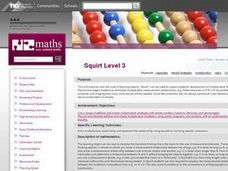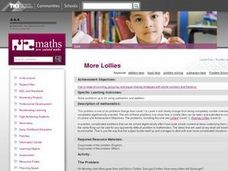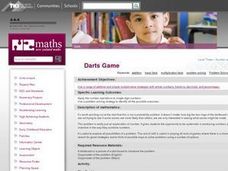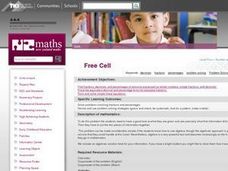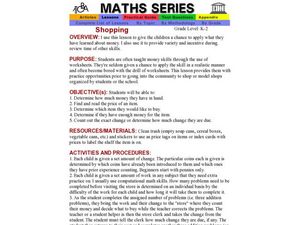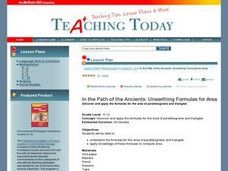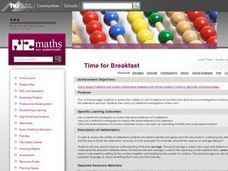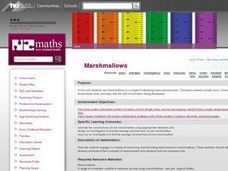Curated OER
Squirt Level 3
Students use the lesson, "Squirt", to support students' development of multiplicative thinking. Squirt encourages students to anticipate multiplicative measurement relationships, e.g. three measures of A fit in B, by partially filling a...
Curated OER
More Lollies
Students review the days of the week and see if the students can recite he sequence using different starting days. Students retell the problem using their own words to check that everyone examines.
Curated OER
Lollies, Lollies, Lollies
Students listen to the problem read to them. They answer some simple questions using number sentences. They then compose a written record of the solution and share their approaches used.
Curated OER
Darts Game
Third graders attempt to determine what the scores of the game in the problem could be. They work with basic multiplication facts to justify the solutions to a dart game and share all of the possible scores.
Curated OER
Free Cell
Fourth graders use algebra to begin solving a problem. The problem has a real world application to engage learners. The main skill is converting fractions and decimals. Also finding the right number sentence for the word problem is...
Curated OER
Create A Question
Students explore mathematical problem solving. Given a case problem, students write a rule to solve problems involving decimal multiplication and division. They invent problems, share them with the class, and solve other student's...
Curated OER
Square Milk Bottle Crates
Students attempt a problem that Students has the potential to have more than one solution. Hence the problem is accessible to a wide range of students. The problem is essentially about finding patterns and this is typical of a number of...
Curated OER
The Take-Awar Bar 1
Students use an Internet tool, "The Take-Away Bar" to solve subtraction problems by breaking them into parts. They write and solve comparison problems. Students make sensible estimates and check the reasonableness of answers. They use...
Curated OER
Decimal Fractions
Students use rounding and compensating with whole numbers and explain how to use the empty number line to show additions and subtractions. They round and compensate in relation to decimal subtraction
Background
Curated OER
Compatible numbers to 20
Learners practice theories dealing with equals sign used as a balance, inequality symbols and practice utilizing a box or some other geometric shape to represent an unknown number. They assess numeracy problems embedded in language-rick...
Curated OER
Points
Students listen to Gill's story and determine how many number points she has. They then find the number of points their own name has and get into groups where all the name points are the same.
Curated OER
Shopping
Learners give change for sums of money. They also solve subtraction problems presented in different forms. The problem Students answer takes a look at a situation from three different perspectives.
Curated OER
Gulls
Students listen to the problem and think about the first question and the number operation that they would use and explain. They work in pairs and record their solutions so that they can be displayed and shared.
Curated OER
Basketball Caps
Students work on a problem, individually or in pairs. They are asked questions that focus on average. They discus that the average number represents an equal redistribution , rather than just being able to state the rule. They write...
Curated OER
The Chicken Run
Fourth graders work in a group of 4 to make rectangle with a 12m length of string. They discuss its perimeter and how they would calculate its area. Then another group of 4 make another rectangle and estimate if the area would be greater...
Curated OER
In the Path of the Ancients: Unearthing Formulas for Area
Students apply the formulas for the area of parallelograms and triangles. Through guided practice, students discover the correct way to apply the formulas. Working in pairs, they write their own problems featuring the formulas.
Curated OER
Beetle Wheels
Second graders link the development of skip-counting patterns to bars on a relationship graph. They also plot our skip-counting patterns on a hundred's board, counting by 2's and also by 4's.
Curated OER
Pede Patterns
Students generate number patterns for certain 'insects' from the mythical planet of Elsinore. Each 'Pede' is made up of square parts and has a number of feet. The patterns all link the number of feet and the number of squares. The...
Curated OER
Time For Breakfast
This unit encourages students to assess the validity of a set of statements and then plan and carry out investigations to find out whether the statements are true. Students then carry out statistical investigations of their own.
Curated OER
Marshmallows
Third graders estimate the volume and mass of one marshmallow using appropriate standard units. They design and carry out an investigation to find the average of volume/mass of one marshmallow.
Curated OER
The Colored Cube Question
Fourth graders examine how to determine the probabilities or likelihood of outcomes. They complete trials to determine probability while using different manipulatives. They determine how games can be made fair or unfair in this unit of...
Curated OER
The Garden
Students talk about the types of insects that you might see if you looked in the garden. They then brainstorm for ideas about how to solve the problem, sort objects into categories and display the results and count the objects in a...
Curated OER
Odd One Out
Ninth graders identify and describe in their own language, the following 2-dimensional shapes: square, circle, box, pentagon; classify objects by shape attributes. They then list a number of properties that distinguish squares from...
Curated OER
Reversing Numbers
Second graders solve a math word problem involving the addition of two digit numbers. They discuss the problem as a class, independently explore the problem, and discuss as a class the solution and how they organized their reversed...


